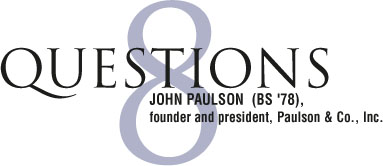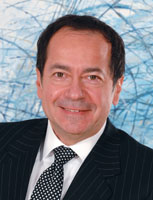

Paulson & Co., Inc., founded in 1994, is one of the largest and most successful hedge fund management companies focusing on event-driven strategies. In mid-2006, based on a strong belief that the subprime mortgage market would fall apart, John Paulson started two new funds concentrated solely on expecting such a collapse. In 2007, his Credit Opportunities I fund grew 590 percent, and three of his other funds more than doubled their money that year. Paulson & Co. now manages an estimated $30 billion in assets.
1. You scored the coup of the year, perhaps the decade, with your bet against the subprime mortgage market. What persuaded you that this was the bet to make, and why do you think other sophisticated investors missed those signs?
The credit market moves in cycles, alternating between extreme pessimism and extreme optimism. We thought in the 2006 cycle of extreme optimism that there wasn’t enough premium paid for risk, and with spreads at all-time lows, the best opportunities were on the short side. After researching the market, we found that the most overvalued securities were the lower tranches of subprime mortgage securities. The securities represented the first loss tranches underlying the lowest-quality mortgages ever underwritten and yet traded at a yield comparable to US Treasuries.
2. Your funds’ great successes up until the past 18 to 24 months were in merger and event arbitrage and bankruptcies. What caught your attention about the subprime mortgage area?
Event arbitrage includes distressed investing, and I’ve been very active in distressed investing since the mid-’80s. What makes us unique is that we also look at distressed credit from a short perspective, shorting investment-grade bonds that we believe will become distressed. So when spreads tightened to all-time lows, we sold our long positions and looked for short opportunities. We did a lot of research across various sectors and thought the subprime bonds were the most overvalued.
3. Some experts have observed that hedge funds and institutional investors helped precipitate the collapse of the subprime mortgage market by seeking ever more high-yield investments and driving lenders to relax their standards. To what extent are they right?
There certainly was excess liquidity in the world, which caused yield spreads to tighten to historic lows across almost all credit classes. There was the perception that, after Treasury bonds, the safest securities were US mortgage-backed securities. The mortgage market became the recipient of much of this excess liquidity.
4. The presidential candidates of both parties have ideas on how to handle the collapse of the subprime market and the painful fallout. What do you believe government, and, for that matter, private institutions, can or should do?
The most important thing is for government regulators and private participants to tighten underwriting standards. When the credit work is done on a mortgage, they should verify borrowers’ income and ensure that the borrower has enough income to service the mortgage.
5. Speaking of government, what is your opinion on whether or to what extent hedge funds should be regulated?
I think it’s a good idea, and we have voluntarily registered with the US Securities and Exchange Commission. The primary purpose of regulation is to protect investors. We support any regulations that protect investors and provide confidence in the market.
6. What kinds of experience and qualities would you say were most important for someone to become a successful hedge fund manager?
First, you have to have expertise in an area that will give you an edge in a particular trading strategy, such as macro, credit, distressed, emerging markets, or event. You also need the same qualities as any successful entrepreneur: persistence, good management skills, and the ability to deliver a superior product. Ultimately, one’s success is based on performance, both in managing a fund and managing a business.
7. You have said that a course in investment banking that you took while an undergraduate at NYU Stern influenced you to enter the field. How did it inspire you?
Gus Levy (BS ’32), the legendary
Goldman Sachs partner, was an NYU Stern graduate and taught
the Distinguished Adjunct Professor Seminar in Investment Banking
with Professor Ernest Block. When he died, John Whitehead,
the then-chairman of Goldman Sachs, took over the course. Mr.
Whitehead also invited other Goldman department heads to teach
particular classes, including Steve Friedman, who subsequently
became chairman of Goldman Sachs and taught the segment on
mergers and acquisitions (M&A); Bob Rubin, who also became
chairman of Goldman and subsequently US Treasury Secretary,
taught risk arbitrage; and John Jamison, another Goldman partner,
taught corporate finance. This course influenced my career
in both M&A and risk arbitrage. I think M&A is the
most exciting part of investment banking, and risk arbitrage
is the most exciting part of money management. Traditionally,
these two areas have been the highest-return areas in an investment
bank and require the highest level of skills.
8. Where do the greatest challenges and opportunities lie for your business in the next couple of years?
In the short to intermediate term, the challenge is to continue to maintain the high level of performance that we’ve experienced and that our investors expect. Longer-term, the challenge is to create a company that can continue without me and continue to prosper.


![]()